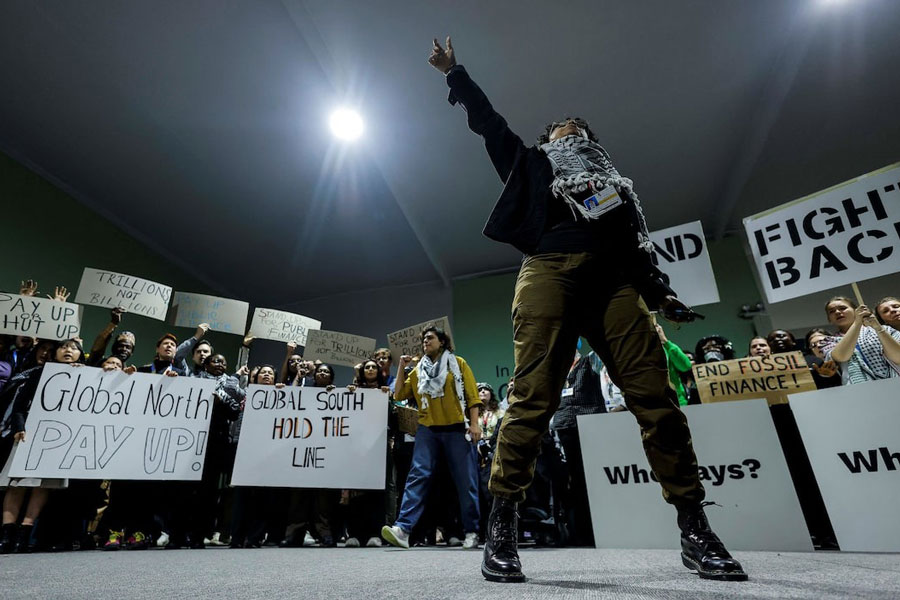Rich nations raise COP29 climate-finance offer to $300 billion, developing nations fume

Published :
Updated :

The European Union, the US and other wealthy countries raised their offer of climate funding for developing nations to $300 billion a year at COP29 on Saturday, in a bid to unlock increasingly tense negotiations already a day into overtime.
The UN climate summit had been due to finish on Friday but ran into extra hours as negotiators from nearly 200 countries - who must adopt the deal by consensus - tried to reach agreement on a funding plan for the next decade.
It was not clear if the revised offer would be enough to lead to a deal, but negotiators from developing countries and island nations on Saturday aired frustration over a process they said was not inclusive, and temporarily walked out of talks.
A $250 billion proposal, drafted by Azerbaijan’s COP29 presidency on Friday, was dismissed as woefully insufficient by developing countries, reeling from the soaring costs of storms, floods and droughts fuelled by climate change.
COP29 has laid bare divisions between wealthy governments constrained by tight domestic budgets and developing nations, while past failures to meet climate finance obligations have also made developing countries mistrustful of new promises.
The new goal is intended to replace developed countries’ previous commitment to provide $100 billion in climate finance for poorer nations per year by 2020. That goal was met two years late, in 2022, and expires in 2025.
Five sources with knowledge of the closed-door discussions said the EU had agreed it could accept the higher number of $300 billion a year. Two of the sources said the United States, Australia and Britain were also on board.
A European Commission spokesperson and an Australian government spokesperson both declined to comment on the negotiations. The U.S. delegation at COP29 and the UK energy ministry did not immediately respond to requests for comment.
With no formal update yet of the deal draft from the COP29 presidency, the mood was tense among negotiating groups.
“There is no clarity on the way forward. There is no clarity on the political will that we need to get out of this,” said Panama’s lead negotiator, Juan Carlos Monterrey Gomez.
Representatives from the least developed countries and small island nations blocs walked out of a negotiating room in frustration, but said they remained committed to finding a deal.
“We have temporarily walked out but remain interested in the talks until we get a fair deal,” said LDC bloc chair Evans Njewa in a post on X.
The Alliance of Small Island States issued a statement confirming it had also walked away from the negotiation temporarily. “We want nothing more than to continue to engage, but the process must be inclusive,” it said.
US climate envoy John Podesta said he expected talks to progress toward a deal.
“Hopefully this is the storm before the calm,” he said.
PUSHING FOR $390 BILLION
Marina Silva, Brazil’s minister of the environment and climate change, had said on Friday that the Amazon rainforest nation - which is set to host next year’s summit - was pushing for $390 billion annually from developed countries by 2035.
“We cannot leave Baku without a decision that lives up to the challenge we are facing,” she said via a translator.
Negotiators have worked throughout the two-week summit to address other critical questions on the finance target, including who is asked to contribute and how much of the funding is on a grant basis, rather than provided as loans.
The roster of countries required to contribute - about two dozen industrialised countries, including the US, European nations and Canada - dates back to a list decided during UN climate talks in 1992.
European governments have demanded others join them in paying in, including China, the world’s second-biggest economy, and oil-rich Gulf states.
Donald Trump’s US presidential election victory this month cast a cloud over the Baku talks. Trump, who takes office in January, has promised to again remove the US from international climate cooperation, so negotiators from other wealthy nations expect that under his administration the world’s largest economy will not pay into the climate finance goal.
A broader goal of raising $1.3 trillion in climate finance annually by 2035 - which would include funding from all public and private sources and which economists say matches the sum needed - was included in the draft deal published on Friday.
Poorer countries have warned that a weak finance deal at COP29 would undercut their ability to set more ambitious targets to cut the greenhouse gas emissions causing climate change.


 For all latest news, follow The Financial Express Google News channel.
For all latest news, follow The Financial Express Google News channel.